
If getting a high GRE Verbal score is critical for your grad school applications, then you’ll need to know how to ace those tricky Reading Comprehension questions. Here, we explain what GRE Reading Comprehension questions look like and give you our top 14 GRE Reading Comprehension tips for both exam prep and test day.
GRE Reading Comprehension Questions: Overview
Before we give you our top GRE Reading Comprehension tips, let’s go over the logistics of GRE Reading Comprehension questions, including what they test, what they look like, and what kinds of passages they accompany.
Reading Comprehension questions appear on the Verbal Reasoning section of the GRE. They’re one of three question types on Verbal (the other two are Text Completion and Sentence Equivalence).
Each Verbal section is 30 minutes long and consists of 20 total questions (you’ll have two Verbal sections on the test in addition to an unscored section, which will be either another Verbal or Quant section).
You’ll get roughly 10 Reading Comprehension questions on each Verbal section; this means that Reading Comprehension questions will account for approximately 50% of your GRE Verbal score.
So what exactly are Reading Comprehension questions? This Verbal question type tests your ability to read, comprehend, and analyze dense, graduate-level reading passages. Some of these questions will ask you about broader concepts, such as the big picture of the passage, while others will ask you about specific details within the passage.
More specifically, GRE Reading Comprehension questions test your ability to do the following:
Quick side note: we've created the world's leading online GRE prep program that adapts to you and your strengths and weaknesses. Not sure what to study? Confused by how to improve your score? We give you minute by minute guide.
You don't NEED a prep program to get a great GRE score. But we believe PrepScholar is the best GRE prep program available right now, especially if you find it hard to organize your study schedule and don't know what to study.
Click here to learn how you can improve your GRE score by 7 points, guaranteed.
- Find relevant evidence and information in the passage
- Distinguish the passage’s main and minor points
- Identify the author’s tone, beliefs, opinions, and/or assumptions
- Accurately infer missing information
- Draw logical and relevant conclusions based on the evidence provided
In terms of setup, Reading Comprehension questions typically come in sets, meaning you’ll often get a handful of questions for each passage. Passage topics will span three general areas:
- Humanities
- Social sciences (including business)
- Natural sciences
Finally, there are three distinct types of GRE Reading Comprehension questions:
- Multiple choice (select one answer choice) — These basic multiple-choice questions make up the majority of Reading Comprehension questions on the GRE. Each question has five answer choices, and just one of these choices is correct. You can identify these questions by the ovals next to their answer choices:
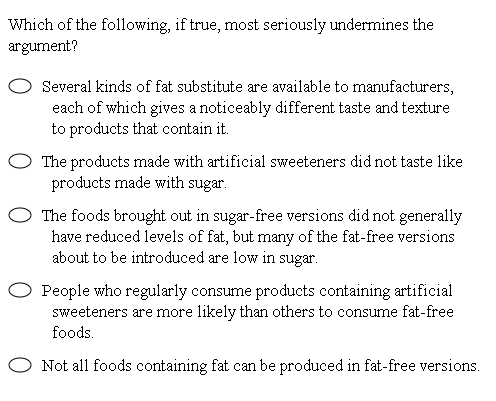
- Multiple choice (select one or more answer choices) — For these questions, you will get three answer choices and may choose one, two, or all of them (meaning there might be more than one correct answer!). You must choose all correct answers to earn credit; there is no partial credit. You can identify this question type by the square boxes next to its answer choices:
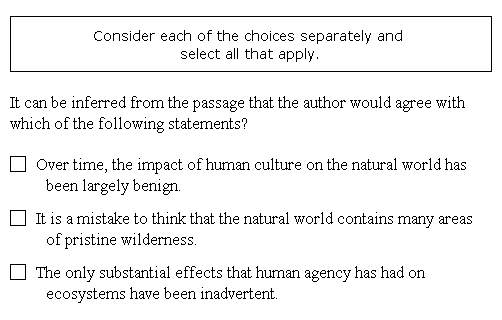
- Select-in-passage — For this unique type of question, you must highlight a specific sentence in the passage that matches the description and/or information provided. You can choose a sentence by clicking any word in it. For longer passages, you may be given just one or two paragraphs from which to choose a sentence:
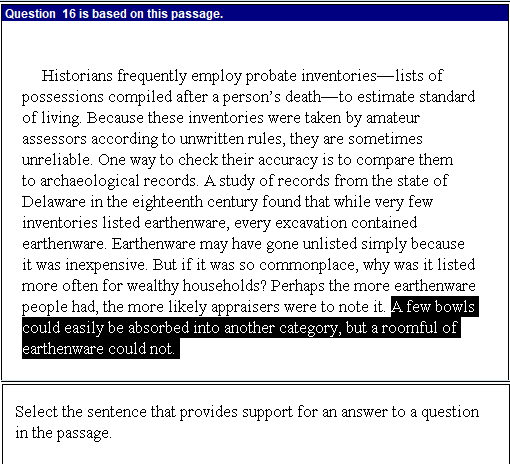
14 GRE Verbal Reading Comprehension Tips
In this section, we give you our top GRE Reading Comprehension tips to help you ace the Verbal section. We’ve split up our 14 GRE Verbal Reading Comprehension tips into two sections:
- Prep and Practice Tips
- Test-Day Tips

GRE Reading Comprehension Tips for Prep and Practice
Use these expert GRE Comprehension tips as you study and prep for the Verbal section.
#1: Read Widely and Actively
A big part of prepping for Reading Comprehension on the GRE is taking time to sit down and read a breadth of academic texts. Doing this will help you get used to the high level of reading both test takers and grad students are expected to have. It will also improve your critical reading skills.
Here are some examples of resources you could use to strengthen your reading skills for the GRE:
- Newspapers
- Academic textbooks
- Research papers
Don’t just read things half-heartedly. Active reading is all about understanding the topic, the main points, the author’s tone, and the key details.
You don’t need to read every passage with which you practice extremely closely (you won’t be doing this on the GRE as we explain in the next tip), but you should learn how to identify the key phrases and words that will point you in the direction of the crux of the passage.
#2: Find Your Ideal Approach to Reading Passages
In order to use your time efficiently on the Verbal section (and Reading Comprehension questions in particular), you need to figure out how you best approach reading passages.
There are three ways you can approach the GRE reading passages:
- Skim the passage first (recommended)
- Read the questions first (also good)
- Read the passage closely (not recommended)
You can find more details on each of these strategies in our guide to the GRE reading passages.
But how can you know which passage-reading approach will work best for you? The easiest way to do this is to try out each method (ideally just the first two) with an official GRE practice test. Choose the method that comes more naturally to you and earns you a higher Verbal score, and then use this in your prep and on test day.
#3: Test Yourself With Official Practice Tests
Once you’ve identified a passage-reading strategy that works well for you, it’s time to start practicing. Official GRE practice tests are the absolute best resources you can use for Reading Comprehension prep, as they’re both highly accurate and similar to what you’ll see on test day.
Assuming you’re taking the computer GRE (the more common version), you’ll want to prioritize the PowerPrep GRE practice tests over the paper tests, since these will give you a much more realistic test-taking experience.
If you run out of free official tests, you might want to consider buying some official resources or practicing with high-quality unofficial tests. Just be sure the tests you’re using are very similar to what you’ll see on the actual exam.
Finally, be sure to time yourself appropriately on any practice tests you take!

#4: Identify Your Weaknesses
Getting a high GRE Verbal score isn’t just about knowing what Reading Comprehension questions look like but also understanding what your biggest weaknesses are—and how you can fix them.
Once you’ve scored the practice test you’ve taken, go over the correct answers, including those for any Reading Comprehension questions you got wrong. Look for any patterns in the questions you missed. Did they tend to be ones focusing on vocabulary words? Ones focusing on the main points of passages?
By identifying what things you’re consistently getting wrong or having trouble with on Reading Comprehension questions, you can start the process of targeting this weak spot more fully in your prep.
#5: Understand What Makes an Answer Choice Wrong
As mentioned in Tip 4, it’s important to spend lots of time going over the correct answers and what you got wrong on the GRE practice tests you take. But you should also devote some of your study time to understanding what makes incorrect answers on Reading Comprehension questions wrong.
Here are some common reasons that a Reading Comprehension answer choice might be incorrect:
- Answer is too specific or too broad (applies to information not explicitly stated in the passage)
- Answer is irrelevant and not clearly connected to the main point of the passage
- Answer makes too big of an assumption
- Answer is too extreme (e.g., uses words such as “all,” “none,” “every,” etc.)
- Answer contradicts something stated in the passage
- Answer is truthful but does not answer the question being asked
Remember that there is (for regular multiple-choice questions) just one unambiguously correct answer. This is the only answer choice that’ll earn you points—try not to fall prey to those answer choices that sound or look as though they could be correct but actually aren’t!
Want to improve your GRE score by 7 points? We have the industry's leading GRE prep program. Built by world-class instructors with 99th percentile GRE scores, the program learns your strengths and weaknesses through machine learning data science, then customizes your prep program to you so you get the most effective prep possible.
Try our 5-day full access trial for free:
#6: Expand Your Vocabulary Knowledge
Some Reading Comprehension questions will ask you about specific vocabulary words used in the passage.
Here’s an example of this type of question, taken from an official GRE practice test:
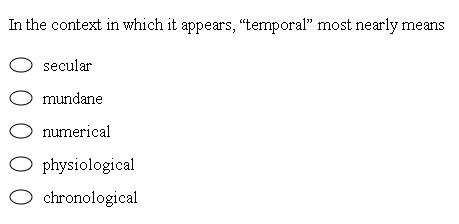
With this level of vocab in Reading Comprehension questions, as well as Text Completion and Sentence Equivalence questions, it’s crucial that you work on improving your vocab knowledge.
You can check out our comprehensive list of 350+ GRE vocab words to get started on your vocab prep, or go straight to our GRE vocab course.
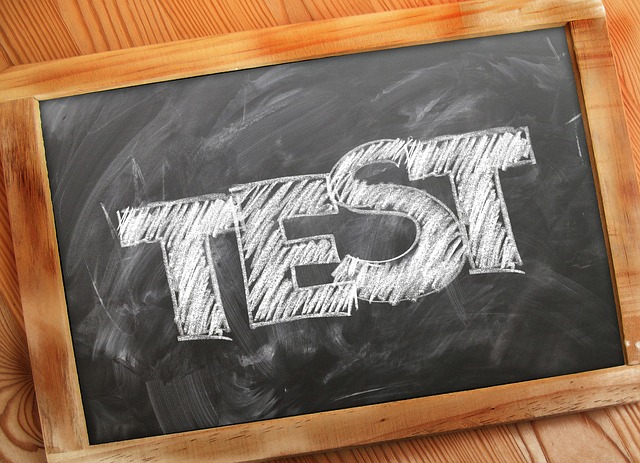
GRE Reading Comprehension Tips for Test Day
This next bunch of GRE Comprehension tips are to be used while taking the GRE.
#7: Come Up With Your Own Answer First
With Reading Comprehension questions, you might be tempted to read the answer choices as soon as you finish reading the question. But it might work better for you to give yourself a moment to try to answer the question in your head before you look at the answer choices.
Doing this should allow you to more quickly identify any obviously wrong answer choices and pick the choice that most closely resembles the solution you came up with on your own.
Just don’t spend way too long trying to come up with an answer. If you’re stuck on the question or pressed for time, it’s perfectly fine to read the answer choices right away and go from there!
#8: Look for Specific Evidence in the Passage
As mentioned, for single-answer multiple-choice Reading Comprehension questions, there will always be one unambiguously correct answer. This means that the correct answer choice is the one that doesn’t fall into any “traps”—it’s not too broad, not too specific, not too irrelevant, etc.
If you think you’ve found the correct answer to a question but aren’t entirely sure, look for specific evidence in the passage that supports this answer. The correct answer will always have direct evidence that supports it in the passage, even if it’s just a few words.
If any part of the passage doesn’t match the answer choice exactly (e.g., perhaps the passage is more specific than the answer choice or it doesn’t mention something explicitly written in the answer choice), chances are the answer choice is wrong and is just trying to trick you!
#9: Focus on the Introduction and Conclusion
Regardless of whether you’re skimming the passage before or after you look at the questions, it’ll help you to pay a little extra attention to the introductory and concluding sentences (or paragraphs, if it’s a longer passage). You don’t have to read these super closely, but you should try to read them a little more closely than you would the rest of the passage.
Why is this important? Well, whereas the introduction will usually provide vital information about the main point of the passage, the conclusion will reaffirm this main point while also clarifying its significance and any results.
In other words, the introduction should explain to you the following:
- The topic of the passage
- The general scope of the passage
- The main point(s) of the passage
And the conclusion should explain to you these points:
- The topic of the passage (restated)
- The main point(s) of the passage (restated)
- The importance of the passage and/or any results, consequences, findings, realizations, etc.
By giving more attention to these two areas in the passage, you’ll have a broad framework to work with before you examine the passage more closely to answer questions and find specific pieces of evidence.
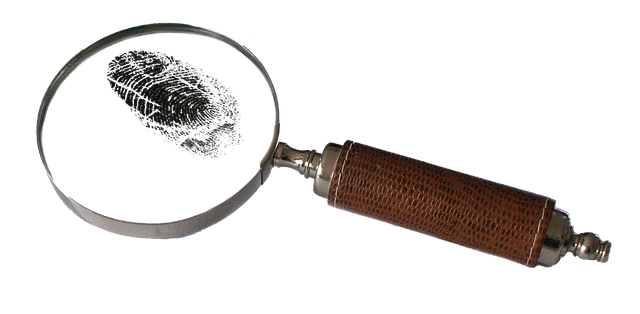
#10: Immediately Identify the Tone and Main Points
One trick to GRE Reading Comprehension questions is to try to identify the main points and tone of the passage as quickly as possible. The main points are typically found in the introductory and concluding sentences or paragraphs (see previous tip), so read these a little more closely than you would the rest of the passage.
As soon as you finish skimming the whole passage, quickly jot down on your scratch paper what you think the topic and main point(s) of the passage are.
As for the tone, the author will usually take either a neutral/objective stance or a stronger, more opinionated stance. Sometimes, the author might have a more complex stance in which he or she might generally agree with something but have some reservations or hesitations about it.
So how can you identify the tone of a passage? As you skim the passage, make note (either mentally or using your scratch paper) of any subjective words and phrases that stand out to you, such as “doubtful,” “should ~ ,” etc. Doing this will give you a better understanding of how the author feels about the topic.
Here’s an example of an official GRE reading passage in which the main point and words indicating the author’s tone have been underlined in red:
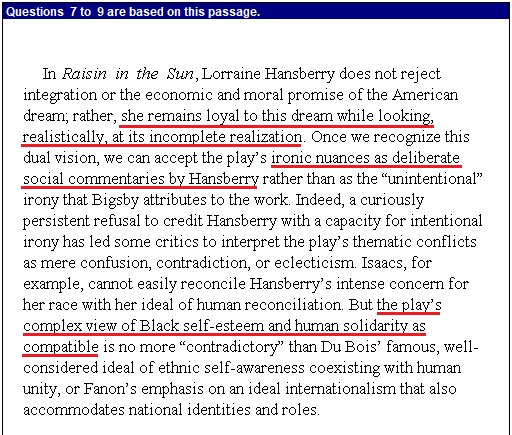
#11: Refer Back to the Passage as Needed
Although I don’t advise reading the passage closely, definitely refer back to the passage and specific parts in it for any questions you don’t immediately know the right answers to. Some GRE Reading Comprehension questions will ask about specific details in the passage, so you’ll very likely need to look back at it in order to find the evidence you need for the question.
Here’s an example of a Reading Comprehension question that asks you about a specific part of the passage; the area of the passage you should refer back to has been highlighted by the test itself:
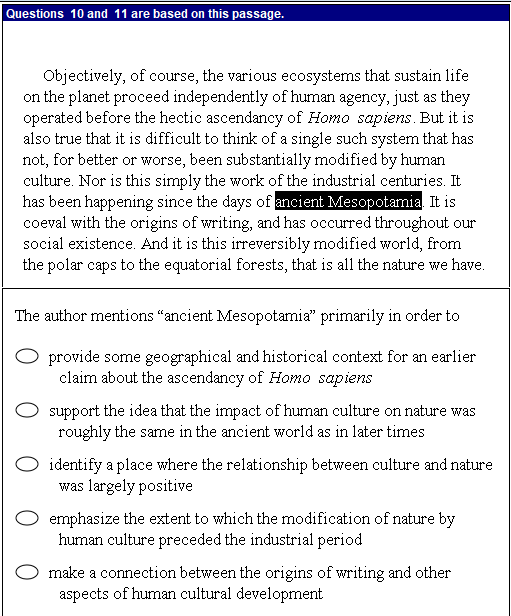
Even if you think you know the answer to a question, it doesn’t hurt to quickly check the passage!
Want to improve your GRE score by 7+ points?
Check out our best-in-class online GRE prep program. We guarantee your money back if you don't improve your GRE score by 7 points or more.
PrepScholar GRE is entirely online, and it customizes your prep program to your strengths and weaknesses. We also feature 2,000 practice questions, official practice tests, 150 hours of interactive lessons, and 1-on-1 scoring and feedback on your AWA essays.
Check out our 5-day free trial now:
#12: Skip Difficult Questions
As with the Quant section and other Verbal question types, it’s perfectly OK (and even encouraged!) to skip any difficult Reading Comprehension questions you come across. You don’t want to waste what little time you have trying to find the answer to a difficult question, especially if doing so will end up taking time away from other easier questions you could answer a lot more quickly.
Ultimately, you must pace yourself and use your time wisely if you hope to get a high Verbal score. Also, don’t forget to mark any questions you skip so that you’ll know which ones to go back to before time runs out for that particular Verbal section.

#13: Use the Process of Elimination
If you get to a Reading Comprehension question you really just don’t know the answer to, try to narrow down the answer choices using the process of elimination.
With this strategy, you’ll go through each answer choice and then check the passage to see whether there’s clear evidence that supports it. Eliminate any answer choices that are clearly wrong and are not 100% supported by the passage. Doing all of this should eventually leave you with only the right answer(s).
#14: Answer Every Question!
There is no score penalty for wrong or missed answers on Verbal, so make sure you answer every single Reading Comprehension question, even if you have no idea what the correct answer is. Don’t forget to do the same on Quant since there’s no score penalty for that section either!
What’s Next?
In addition to Reading Comprehension questions, GRE Verbal consists of Sentence Equivalence and Text Completion questions. Expand your Verbal skill set by using our expert tips for Sentence Equivalence questions and Text Completion questions.
Need further help with the GRE Verbal section? Then check out our detailed step-by-step guide to how to study for GRE Verbal and our collection of the best resources for GRE Verbal practice.
What is a good Verbal score on the GRE? Our guide goes over the ins and outs of GRE Verbal scoring and offers tips on how you can set and reach your own Verbal goal score.
Ready to improve your GRE score by 7 points?
We've written a eBook about the top 5 strategies you must be using to have a shot at improving your GRE score.
Download it for free now:

